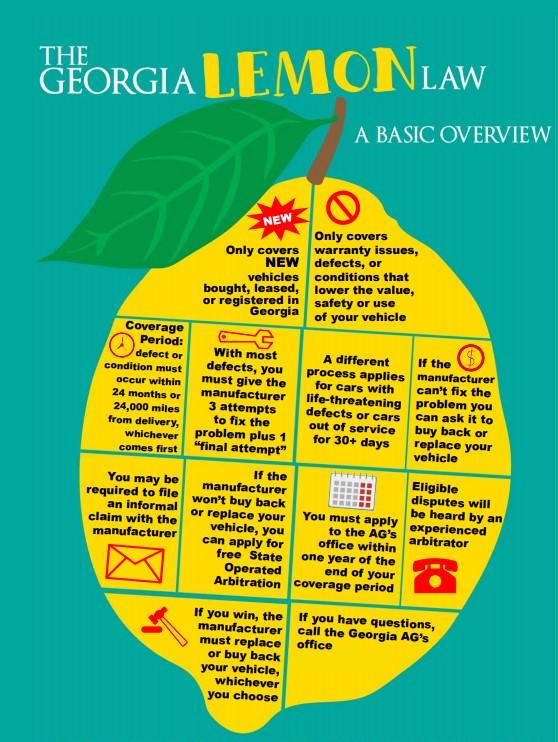
The Georgia Lemon Law
Georgia's Lemon Law is designed to help you get a defective vehicle repaired by the manufacturer. If your motor vehicle cannot be repaired after a reasonable number of attempts and is found to be a "lemon", the law requires the manufacturer to replace or buy back (repurchase) the vehicle.

The Georgia Attorney General’s Consumer Protection Division (CPD) administers Georgia's Lemon Law program. Although CPD does not represent you in this self-help process, it is available to provide information or answer questions about eligibility requirements and the process. This office also provides, at no cost to the parties, State-Operated Arbitration.
Make Sure You’re Eligible
To complete the Lemon Law Process, you must be able to answer “Yes” to the following questions:
- Did you purchase, lease, or register your new motor vehicle in Georgia?
- Did you take your vehicle to a manufacturer’s authorized dealer or repair facility to have the problem fixed? (Repair attempts made at repair shops not authorized by the manufacturer may void the warranty and disqualify you from entering the Lemon Law process.)
- Did your repair visit(s) to the manufacturer’s authorized dealer or repair facility take place within the Lemon Law rights period (24 months from the date you took delivery of the vehicle or the first 24,000 miles of your use — whichever occurs first)? To determine the exact date your Lemon Law rights period expires, be mindful of the mileage you put on the vehicle and how much time has passed since you acquired it.
- For example, if you acquired the vehicle on June 1, 2018, and put fewer than 24,000 miles on your vehicle before 24 months from the date you acquired it, then your Lemon Law rights period expires at the end of the day on June 1, 2020.
- Conversely, if you acquire the vehicle on June 1, 2018, and put 24,000 miles (more than the miles already on your vehicle at the time of delivery) on your vehicle before June 1, 2020, then your Lemon Law rights period expires on the day you reach the 24,000-mile threshold. So, if you put 24,000 miles on the vehicle as of March 15, 2020, your Lemon Law rights period would expire on that date.
- Are you the person or business who originally purchased or leased the new motor vehicle, and is the title still in your name?
- Does the motor vehicle fit either one of these descriptions?
- It was purchased or leased for personal, family, or household use.
- It is one of 10 or fewer motor vehicles purchased or leased yearly for a business other than a limousine rental service.
- Does the problem you’re having with the motor vehicle meet at least one of these criteria?
- It is covered under the manufacturer’s warranty (or, in legal terms, “it renders the new motor vehicle nonconforming to a manufacturer’s warranty”).
- It substantially impairs the motor vehicle’s use, value, or safety.
Keep This Important Information in Mind
- Pay attention to dates – New vehicles are covered under the Lemon Law only during the Lemon law rights period (the first 24 months after delivery or for the first 24,000 miles of operation, after delivery, whichever occurs first).
- There is a time limit on filing for arbitration – You have 12 months after the expiration of your Lemon Law rights period to submit your State-Operated Arbitration Application.
- The Lemon Law does not cover all types of vehicles – Motorcycles, mopeds, all-terrain vehicles, boats, trucks with a gross vehicle weight rating of more than 12,000 pounds, and vehicles that are not self-propelled (e.g., trailers, campers) are not covered by the Lemon Law.
- The Lemon Law covers some motor homes – If your new motor vehicle is a self-propelled motor home, it is eligible for review under the Lemon Law. However, the type of problem or defect will determine if it is eligible. The Lemon Law covers its chassis and coach; the Lemon Law does not cover parts of your motor home that are designated, used, or maintained primarily as living quarters, an office, or commercial space (unless those parts are negatively impacted by issues with the motor home’s coach and chassis).
- Your leasing company must be notified if you lease the vehicle – Your leased vehicle is covered by the Georgia Lemon Law. You will be required to notify the lessor (the company who leased the vehicle to you) in writing at a specific point in the Lemon Law Process.
- Keep meticulous records – This is a necessity. As the consumer, the burden is on you to demonstrate that you carefully followed the Lemon Law Process and made the required attempts to have the problem with your new vehicle fixed. Record the date and odometer reading on your vehicle each time you submit the vehicle for repair and the date and odometer reading each time you pick up your vehicle. Start a file and keep copies of all your repair orders together. As you proceed through the process, you will be adding additional information and copies of other relevant documents to this file.
After you have registered with this office, proceed to our Step-by-Step instructions to follow under Georgia's Lemon Law.